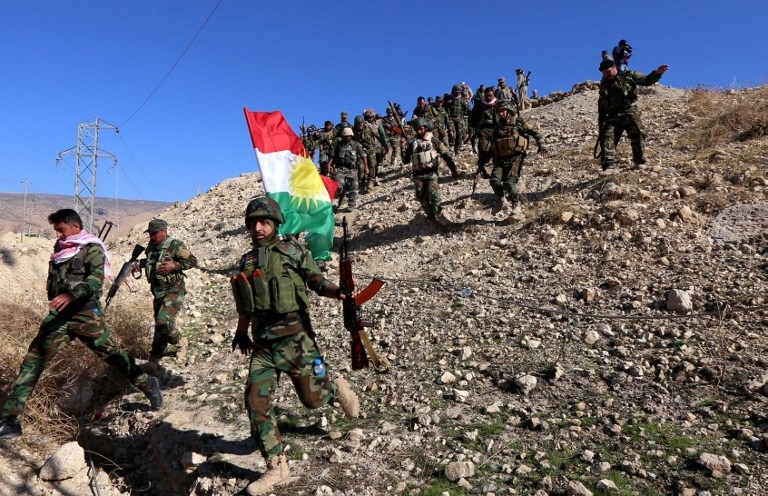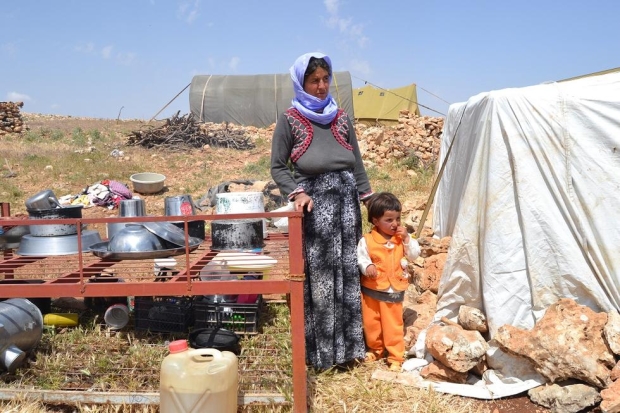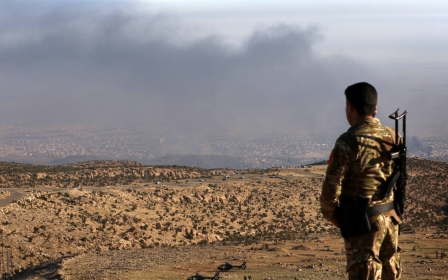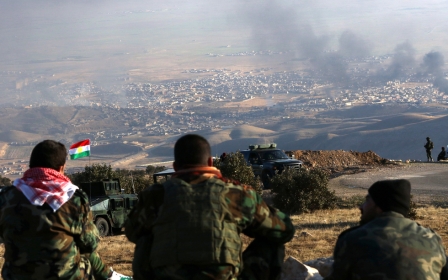ANALYSIS: Sinjar becomes proxy battle amid rising Kurdish tensions

Clashes in Sinjar between Yazidi militia fighters and peshmerga forces loyal to Iraq's semi-autonomous Kurdish region may only be the beginning of a protracted proxy battle for dominance in the lands liberated from the Islamic State group, according to analysts.
Fighting between the Sinjar Resistance Units (YBS), a Yazidi militia with links to the Kurdistan Workers Party (PKK), and peshmerga fighters controlled by the Kurdistan Regional Government (KRG) in Erbil broke out earlier this month as the former allies in the battle against IS turned their guns on each other.
On Tuesday a woman was killed and several others injured while protesting against the KRG-backed peshmerga in the Yazidi-majority town of Khanasoor, according to the pro-KRG Rudaw news agency.
And with each side blaming the other for starting the shooting, allegations of outside interference on both sides could see an ostensibly local dispute over territory escalate into a new front in Turkey’s decades-long war with the Kurdistan Workers Party (PKK).
The YBS was originally formed during the US-led occupation of Iraq but its close links with the PKK, which is considered a terrorist group by Turkey, the US and the EU, and the Syria-based YPG, the Kurdish People’s Protection Units, stem from the support it received from them during the desperate 2014 battle against IS, which killed thousands of people as it advanced through Sinjar.
The Roj Peshmerga on the other hand is made up of Kurdish refugees from Syria and backed by the KRG, leading some to accuse the group of acting as a proxy for Turkey, which is a strong supporter of the ruling Kurdish Democratic Party (KDP) of KRG President Massoud Barzani, by trying to remove PKK influence from the region.
'Totally provocative initiative'
The pro-PKK Firat News Agency posted a video last week purporting to show family members of Yazidis killed in the fight against IS calling for the Peshmerga forces to leave.
“The latest attack on our people was carried out by groups who fled from Shengal, Tal Afar and Rojava to South Kurdistan (Iraqi Kurdistan) and were armed and trained here by the Turkish state," said Ilyas Qasim, a resident of Sinjar.
"These people who call themselves 'Rojava Peshmerga' and who are led by the KDP president are acting with the support and instruction of the Turkish state.
“This group is attacking YBS/YJS which is comprised of Yazidi women and youth that liberated thousands of square kilometres of the Yazidi land with their blood."
However, the video follows a similar set of declarations posted on Twitter by an assistant to President Barzani which claimed to show public opposition to the YBS in Sinjar:
In a statement, the YBS also accused Turkey of instigating the violence, which it said had begun when the Roj Peshmerga tried to seize its positions in the town of Khanasor.
"It is a totally provocative initiative," the YBS said, branding the Peshmerga an "occupying force".
However, in a separate statement, the Peshmerga said they had been attacked first. The YBS controls the checkpoints in Sinjar's town centre as well as Sinune, and is believed to be backed by about 130 fighters from the PKK’s official armed wing.
Al-Monitor reported that the fighting began after front-loaders sent by the Peshmerga started digging trenches between the villages of Hanesor and Sinune.
Popular Mobilisation Units intervene
Another spanner has been thrown in the works with the intervention of the Popular Mobilisation Units (PMUs) who consider the YBS to be part of their ranks and have now threatened to step in to protect them from further attacks.
The PMUs, largely made up of Shia Arabs, are backed by the Iraqi central government and are viewed with suspicion by some Sunnis and Kurds over allegations of sectarianism.
In a warning issued via Twitter, the PMUs said they would "now consider new operations to remove all illegal KDP and IS sieges on the Yazidi people in Sinjar”.
"At this stage we are negotiating with all parties," a spokesperson clarified for Middle East Eye.
"We have made it clear the YBS is a local force of Sinjar and a part of the PMUs. We will not tolerate attacks on our units and are in full support of the Yazidi people."
As part of the PMUs, the YBS receives funding from Baghdad. But Iraq’s central government has largely stayed out of the affair - primarily due to the on-going campaign in Mosul - though one senior government official, speaking off-the-record, said that they were "not happy with the presence of the PKK in Sinjar".
"We have no interest for Iraq to have any foreign presence on our soil," a high-level source in the Iraqi central government explained. "And we are not accepting any presence for anyone to make a threat to our fighters. This is a principle for us."
Amid growing confusion and escalating tensions, a number of Iraqi Kurdish politicians used the opportunity of the annual Sulemani forum last week to both call for unity and to denounce the PKK's presence in Sinjar.
Analyst Matthew Barber told MEE that despite the proclamations by both sides in the spat, the civilians of Sinjar were largely split on whether they preferred their security to be administered by the YBS or KRG-backed forces.
"It would be a mistake to say that most Yazidis support the PKK," he explained. "However, the majority of Sinjari Yazidis definitely view the KDP with distrust and animosity, especially following the Peshmerga's abandonment of the Yazidis when the genocide began in August 2014."
"Yazidis may change their minds about this balance of power if it results in violence, such as that of this past weekend. Some may feel that KDP hegemony, as much as they hate it, could be preferable to ongoing instability."
'Hearts and minds'
In August 2014, IS forces swept into Sinjar and killed over 5,000 Yazidi men in a massacre that has since been recognised as genocide by the UN. At least 40,000 Yazidis ended up trapped in the Sinjar mountains, besieged by IS.
Although the US intervened with air strikes, Barber said the involvement of the PKK and the People's Protection Units (YPG), who had cleared a path down from the mountains allowing more than 30,000 Yazidis to escape, had come to be seen by many as a turning point.
"The PKK affiliates won many hearts and minds when they battled IS and saved scores of thousands of Yazidi lives, after the Peshmerga withdrew from Sinjar," said Barber.
While the YBS retain popularity among Yazidis and some Kurdish groups, Kirk Sowell, publisher of the biweekly newsletter Inside Iraqi Politics, told MEE that the KDP had a "clear military advantage" as a consequence of the aid it had received for the war against IS.
Yet it hoped to push the YBS out "by threats and pressure rather than all-out war because of the political sensitivities of fighting other Kurds" he added.
"The PKK's withdrawal, which eventually the KDP could force, will not necessarily lead to stability given Yazidi resentment at KDP domination,” said Sowell.
“But it is impossible to predict what the situation will look like, other than to say there will be some kind of stalemate, as the Hashd [PMU] is still fighting for Tal Afar and there is also Sunni opposition to the KDP in Western Ninawa."
Turkey's role
Analysts have seen Turkey's role in much of the goings-on in Sinjar. Turkish President Recep Tayyip Erdogan warned in October that “Sinjar is on the way to becoming a new Qandil [the PKK base in the mountains of northern Iraq where Turkey has conducted air strikes], we cannot allow that.”
The clashes between the YBS and Peshmerga began shortly after Barzani's high-profile 27 February trip to Turkey, when for the first time he was met in Ankara by President Erdogan and the Kurdistan flag was flown next to Turkey's national flag - much to the chagrin of Turkish nationalists.
"Turkey is the KDP's chief patron and views the PKK as its greatest enemy, so of course it plays an important role contextually," explained Sowell.
"That said, Barzani is not trying to take over Sinjar for Turkey - the KDP views it as part of their territory, as a strategic prize, and would fight for it regardless of Turkey."
Speaking to Turkish media last week, YBS commander Tirej Sengali warned against the Iraqi Kurds becoming "toys of the Turkish state" and said they would "never allow another massacre of our people to take place".
Meanwhile a PKK source this week denied the group was trying to seize control of Sinjar and called on the KDP to act "more responsibly".
"The KDP has constantly turned down our suggestion that we set up an autonomous force and entity there," he said. "Now they are sending troops and saying we will act like rulers there.
"The Yazidis were faced with a genocide. We saw that coming and told the KDP that we would send guerillas there. They turned us down."
The source played down reports that local Yazidi tribal leaders had called for the PKK to leave Sinjar.
"We don’t want to rule over the Yazidis. We want them to be autonomous and rule over Sinjar," he said.
Barber said that calls for the PKK to leave Sinjar seemed to misunderstand or sidestep the YBS’s role in enabling local Yazidis to organise and defend themselves against IS militants – and that a resolution to the standoff was unlikely to be found anytime soon.
"The PKK is unlikely to cease its support for the YBS. The KDP has implemented a blockade against Sinjar for well over a year to hinder the progress of the YBS, whom it views as political competitors thwarting its agenda of retaking full control of Sinjar,” he said.
“This blockade prevents displaced Yazidi civilians who have lived in camps for two-and-a-half years from returning home to rebuild their lives.
"It also means that the YBS's sole supply line is Rojava (the Kurdish-controlled area of Syria). This link is important for PKK affiliates on both sides of the Syrian-Iraqi border."
New MEE newsletter: Jerusalem Dispatch
Sign up to get the latest insights and analysis on Israel-Palestine, alongside Turkey Unpacked and other MEE newsletters
Middle East Eye delivers independent and unrivalled coverage and analysis of the Middle East, North Africa and beyond. To learn more about republishing this content and the associated fees, please fill out this form. More about MEE can be found here.





